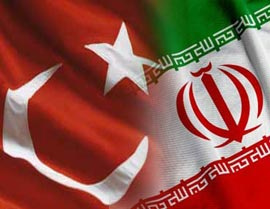Turkey: Friend or Foe?
Holding Negotiations in Istanbul Could Be to Iran's Advantage

Relations between Iran and Turkey and their developments in the past days and weeks have caught the attention of all political and international analysts. We sat down for a talk with Firooz Dolatabadi, Iran’s former ambassador to Turkey, to discuss Turkey’s policy with regard to Syria and its effect on Iran-Turkey relations.
Iranian Diplomacy: In recent months, Turkey has actively taken stances regarding developments in Syria. Even last week, almost 70 countries officially recognized the Syrian opposition in a meeting in Turkey. Considering these developments, what do you make of Turkey’s policy with regard to Syria?
Firooz Dolatabadi: In my opinion, Turkey’s policy regarding Syria is a mistake. The Americans and Europeans have involved Turkey in this issue so that they can damage this country’s relations with its important neighbors such as Iran. Because of this position, Turkey will certainly encounter problems domestically as well. This is because Alawiyyins in Turkey, who Turkey claims have a population of close to 20 million people, are against these Turkish policies. Turkish elections also show the strength of Alawiyyins in that country. They claimed almost 20 percent of the votes in the recent elections there. There are also other political parties that support the Alawiyyin, but haven’t passed the 10 percent obstacle yet.
IRD: It seems that the Turkish military is also against Turkey’s position with regard to Syria. Is this true?
FD: Yes, the military is also strongly opposed to this policy. Anyway, it is a wrong policy and it seems that it has failed. This is why we can observe that Turkey’s stance with regard to Syria has become much more moderate than six months ago. However, Western countries do not want this policy to change and don’t want this issue to be followed up in a place like France. This is because if Turkey leaves the arena, Western countries’ defeat will come sooner. Unfortunately, in my opinion, this is a wrong policy that the Turkish government has adopted and it has seen its result until now.
IRD: Can we say that relations between Iran and Turkey have changed under the influence of Turkey’s behavior towards Syria?
FD: Yes, it is certain that Turkey’s harsh policy with regard to Syria was a big mistake on Turkey’s part. But we have to be aware of the fact that relations between Iran and Turkey are defined on three levels. The bilateral level has no problems and will probably not face any future problems. There is also the regional level at which the two countries only have differences regarding Turkey’s stance on Syria, one which has weakened in the past few months. But the Syrian issue should not damage relations between Iran and Turkey, because Turkey’s stance is weakening. In the view of Turks and even neo-Ottomans, Arabs are traitors who caused the fall of the Ottomans and destroyed its great power. Therefore, Arab-Turk relations will not improve anytime soon. The third level of Iran-Turkey relations is the international level. Turks make their decisions at the international level within the confines of UN resolutions and have never accepted the US’s unilateral sanctions on Iran, for example. We must pay attention to the fact that damaging relations between Iran and Turkey on one level will cause the two countries to feel this hostility on other levels too. Whoever or whatever damages bilateral relations between Iran and Turkey because of the Syrian issue, will certainly hurt Iran’s national interests and its national security, and will surely urge Turkey to take positions on regional and international issues, such as sanctions, that are closer to those of the West.
IRD: It seems that this difference of opinion between Iran and Turkey regarding Syria has also shown itself in the discussion of where to hold negotiations between Iran and the 5+1 group. Despite Turkey’s interest, Iran has yet to welcome Turkey as the host and it has even suggested Baghdad as a possible alternative. How do you evaluate this behavior?

